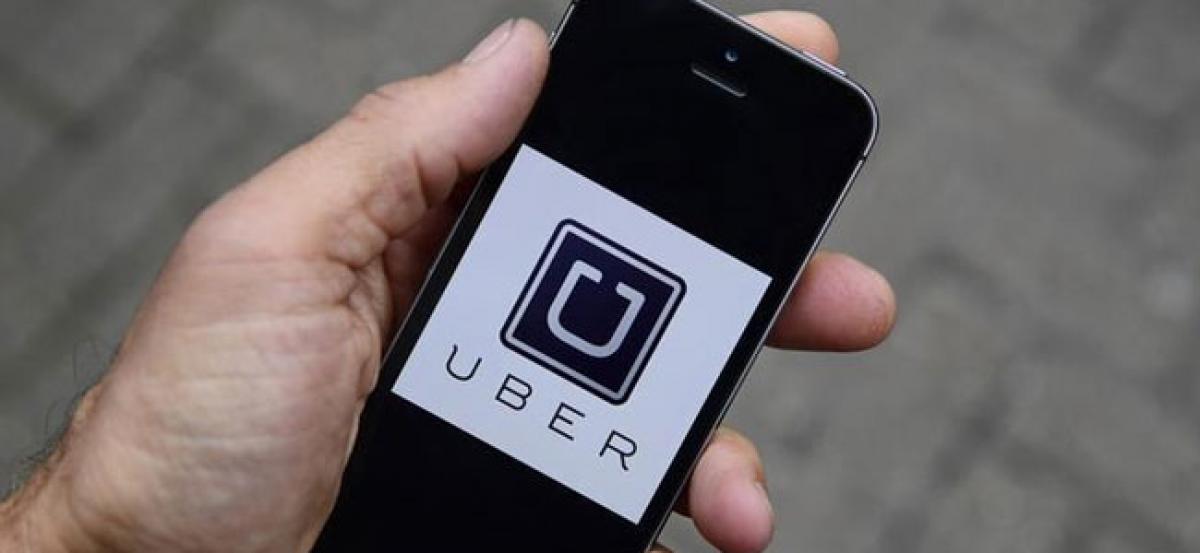Live
- Cong in direct fight with BJP on 45-50 seats in Delhi Assembly election: Sandeep Dikshit
- Vijay Diwas: Assam Rifles organises Half Marathon in Tripura
- Delhi HC to hear on Monday plea against suppression of CAG reports by CM Atishi
- Collaboration, innovation, PPP key to achieve 2047 goals: Jitendra Singh
- Portraits of National Leaders to be Unveiled in Karnataka Assembly Hall
- Kejriwal's claims on vision for development ridiculous: Delhi BJP
- One nation, one election need of the hour: Mukhtar Abbas Naqvi
- Educational Trips in South Kanara Put on Hold Following Murudeshwar Drowning Incident
- Karnataka Temple Embraces Mechanical Elephant for Cruelty-Free Ceremonies
- Temple modelled after Ram Mandir to be constructed in US
Just In

Uber Technologies Inc urged Taiwan President Tsai Ing-wen to let the island\'s people decide whether they want Uber services in Taiwan, the latest salvo in the wrangle between the authorities there and the global ride-hailing service company.
Uber Technologies Inc urged Taiwan President Tsai Ing-wen to let the island's people decide whether they want Uber services in Taiwan, the latest salvo in the wrangle between the authorities there and the global ride-hailing service company.
Uber's comments were made in an open letter to the island's president posted on its website on Thursday.
They came after transport authorities said this week they would ask Apple Inc and Alphabet Inc's Google to pull Uber's apps available in Taiwan from their app stores, including UberEATS, its newest meal takeaway service.
Late last month, Taiwan's cabinet said policymakers had reached a consensus on raising potential fines that would affect Uber's operations in Taiwan from at most T$150,000 ($4,707.36) now to as much as T$25 million.
"These developments directly threaten the interests of over a million Taiwanese citizens, especially the mothers, fathers, retirees, professionals, and the otherwise unemployed who have come to rely on the economic opportunities Uber has created," Uber said in the letter signed by Mike Brown, regional general manager of Uber Asia Pacific.
Uber operates in Taiwan as an internet-based technology platform rather than as a transportation company, which Taiwanese authorities have said is a mis-representation of its service and ordered it to pay back taxes. However, Uber has said it complies with local regulations, including paying its taxes.
Uber has been facing similar legal scrutiny in markets across Asia. It entered the Taiwan market in 2013, and its growing popularity has triggered anger from domestic taxi drivers, who staged a massive protest against Uber earlier this year.
Appealing to Tsai's push to turn Taiwan into a Silicon Valley in Asia, Uber said it wanted to bring more services, like tech-powered carpooling and self-driving vehicles, to the island.
Taiwan's existing laws are a "poor fit for new technologies and business models", Uber said in its letter, adding that the actions against Uber also deter entrepreneurs and foreign investment.
"We have submitted multiple proposals and updates in an effort to demonstrate our commitment to working together to recognize, and regulate, ridesharing, which is an entirely new technology and business model for Taiwan," it said.
"So we ask you, President Tsai, to please guide the dialogue on innovation, by convening a public hearing on ridesharing and letting Taiwan decide," Uber said.
In response, Taiwan's Presidential Office said it hopes Uber will continue its consultations with the government.
"(We) also welcome foreign capital and technology to Taiwan, including innovative new economic models like Uber," it said in a statement.
Uber's Taiwan general manager Likai Gu told Reuters in a telephone interview on Thursday that the company remains optimistic about a "positive resolution" of the issues in Taiwan.
There are over 10,000 driver partners registered on Uber's platform in Taiwan, estimated Gu. He said drivers must register with a Taiwanese ID card, which means the individual is a citizen, and a valid Taiwanese driver's license.
"That doesn't necessarily equate to jobs, but it's people who decide that their current income opportunities are not enough," said Gu.
"They want to convert these cars into something that helps them earn additional income, instead of something that becomes a financial burden."

© 2024 Hyderabad Media House Limited/The Hans India. All rights reserved. Powered by hocalwire.com







